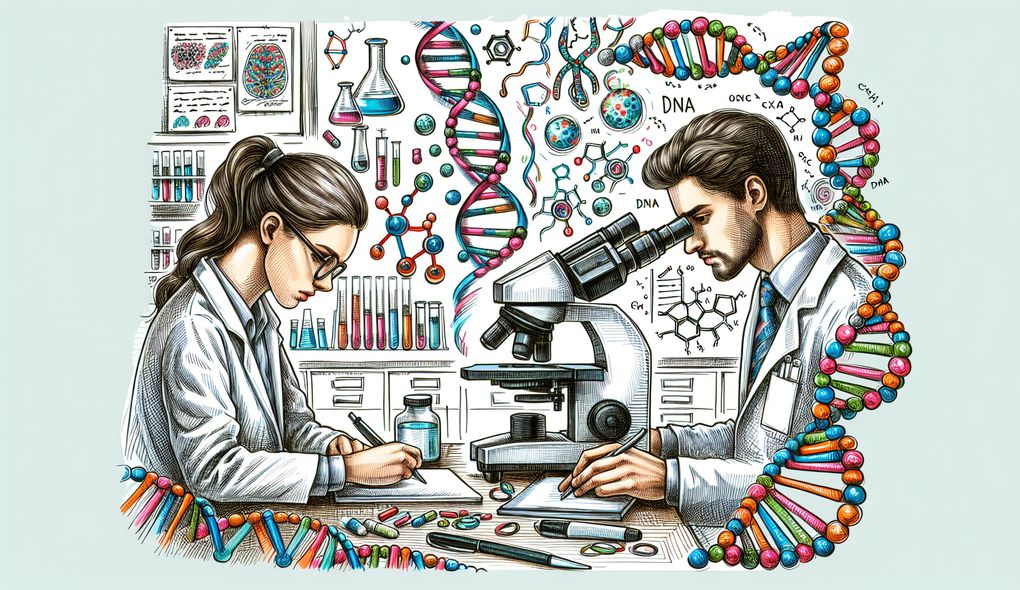Describe your experience with molecular genetic testing techniques such as PCR, sequencing, and microarray analysis.
SENIOR LEVEL

Sample answer to the question:
I have experience with molecular genetic testing techniques such as PCR, sequencing, and microarray analysis. In my previous role, I regularly performed PCR to amplify specific DNA sequences for analysis. I also conducted sequencing to determine the order of nucleotides in DNA, and utilized microarray analysis to study gene expression patterns. These techniques were crucial in identifying genetic variations and mutations in patients. I have a strong understanding of the principles behind these techniques and can confidently apply them in a clinical setting.
Here is a more solid answer:
I have extensive experience with molecular genetic testing techniques such as PCR, sequencing, and microarray analysis. In my previous role as a Molecular Genetic Pathologist, I performed these techniques on a daily basis to diagnose genetic diseases and understand the genetic basis of disorders. For PCR, I designed primers and optimized reaction conditions to amplify specific DNA regions of interest. I then analyzed the resulting amplicons using gel electrophoresis to detect genetic variations. In terms of sequencing, I utilized Sanger sequencing to determine the nucleotide sequence of DNA fragments, which helped identify mutations and genetic abnormalities. As for microarray analysis, I conducted gene expression profiling using microarrays to study the differential expression patterns in various diseases. Additionally, I have extensive experience in interpreting complex genetic data, including analyzing sequencing results and identifying pathogenic variants. I have also managed a clinical genetics laboratory, overseeing quality control, test validation, and ensuring compliance with accreditation standards. Furthermore, I have actively engaged in research, having published several research papers in peer-reviewed journals. I believe in the importance of continuing education and professional development, regularly attending conferences and workshops to stay updated with the latest advancements in molecular genetic testing techniques.
Why is this a more solid answer?
The solid answer provides more specific details about the candidate's experience with molecular genetic testing techniques, including their application in a clinical setting. It also addresses all the evaluation areas mentioned in the job description. The candidate demonstrates proficiency in PCR, sequencing, and microarray analysis, and emphasizes their ability to interpret complex genetic data. They also highlight their experience in managing a clinical laboratory, their proven ability in research, and their commitment to continuing education and professional development. However, the answer can be further improved by providing examples of specific research projects or accomplishments.
An example of a exceptional answer:
Throughout my career as a Molecular Genetic Pathologist, I have gained extensive expertise in molecular genetic testing techniques such as PCR, sequencing, and microarray analysis. In my previous role at a renowned genetics laboratory, I led a team of scientists and technicians, overseeing the development and implementation of cutting-edge molecular diagnostic tests. Regarding PCR, I have designed and validated custom primer sets, optimizing reaction conditions for accurate amplification of target genes. By utilizing sequencing technologies, including next-generation sequencing, I have successfully identified rare genetic variants, detected structural rearrangements, and uncovered novel gene mutations responsible for genetic diseases. Notably, I have collaborated with renowned researchers on several groundbreaking studies, resulting in high-impact publications in prestigious journals. In one such study, we elucidated the genetic basis of a rare neurological disorder, leading to improved patient diagnosis and management. Additionally, I have extensive experience in microarray analysis, utilizing advanced bioinformatics tools to analyze large-scale gene expression datasets and identify molecular signatures associated with disease progression. To stay at the forefront of the field, I actively participate in national and international conferences, where I share my research findings and learn from fellow experts. My commitment to continuing education has led me to pursue advanced certifications in molecular genetic pathology, further enhancing my knowledge and skills.
Why is this an exceptional answer?
The exceptional answer provides a comprehensive and detailed account of the candidate's experience with molecular genetic testing techniques. They showcase their leadership skills by mentioning their experience in managing a team and their involvement in the development of cutting-edge molecular diagnostic tests. The candidate also highlights their research collaborations and publications, demonstrating their proven ability in research. The exceptional answer showcases the candidate's commitment to staying at the forefront of the field through participation in conferences and pursuit of advanced certifications. Overall, the answer demonstrates a high level of expertise and a strong track record in molecular genetic testing techniques.
How to prepare for this question:
- Highlight specific examples of your experience with PCR, sequencing, and microarray analysis, including any research projects or publications.
- Discuss your proficiency in interpreting complex genetic data and provide examples of how you have applied your analytical and problem-solving skills.
- Emphasize your experience in managing a clinical laboratory, including your responsibilities in test development, validation, and quality control.
- Demonstrate your proven ability in research by mentioning published research in peer-reviewed journals and any collaborations with renowned researchers.
- Discuss your commitment to continuing education and professional development, such as attending conferences and pursuing advanced certifications.
What are interviewers evaluating with this question?
- Expert knowledge in molecular genetic testing techniques
- Ability to interpret complex genetic data
- Experience in managing a clinical laboratory
- Proven ability in research
- Commitment to continuing education and professional development

